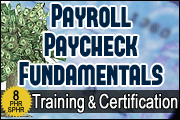What Are The Most Common Requirements For Paycheck Administration?
Paycheck administration involves various tasks related to processing employee compensation. Common requirements for paycheck administration typically include:
- Collecting And Managing Employee Information

- Time and Attendance Tracking
- Calculating Payroll
- Tax Withholding and Reporting
- Benefit Deductions
- Compliance with Labor Laws
- Record Keeping
What Are The Key Concerns / Most Difficult Part Of Administering Paycheck Fundamentals?
Administering paycheck fundamentals involves several key concerns and challenges, including:
- Accuracy:
Ensuring that all calculations related to wages, taxes, deductions, and benefits are accurate. Mistakes in any of these areas can lead to legal issues, employee dissatisfaction, and financial discrepancies.
- Compliance:
Staying up-to-date with constantly changing tax laws, labor regulations, and employment standards at federal, state, and local levels. Failure to comply with these regulations can result in penalties and legal consequences.
- Data Security:
Safeguarding sensitive employee information, including social security numbers, bank account details, and salary information, to protect against data breaches and identity theft.
- Timeliness:
Processing paychecks in a timely manner to ensure employees are paid accurately and on schedule, which is essential for maintaining morale and meeting financial obligations.
- Employee Queries:
Addressing employee inquiries and concerns regarding their pay, deductions, taxes, and benefits in a prompt and satisfactory manner to maintain employee trust and satisfaction.
- Integration with HR and Accounting Systems:
Ensuring seamless integration between payroll systems, human resources (HR) systems, and accounting software to streamline data flow, minimize errors, and improve efficiency.
- Payroll Taxes and Reporting:
Managing payroll taxes accurately and submitting required reports to tax authorities on time to avoid fines and penalties.
- Employee Classification:
Properly classifying employees as exempt or non-exempt, full-time or part-time, and ensuring compliance with overtime pay regulations.
- Garnishments and Deductions:
Handling wage garnishments, child support orders, and other court-ordered deductions while complying with legal requirements and protecting employee privacy.
- Audit Preparedness:
Maintaining accurate records and documentation to ensure readiness for internal audits, external audits, and government inspections.
- Benefit Administration:
Administering employee benefits such as health insurance, retirement plans, and paid time off, including tracking accruals, eligibility, and enrollment changes.
- Communication:
Effectively communicating payroll-related policies, procedures, and changes to employees to minimize confusion and ensure understanding.
What Are The Most Common Errors Of Paycheck Administration?
Paycheck administration involves several intricate processes, and errors can occur at various stages. Some of the most common errors include:
- Failure to Account for Garnishments or Levies:
Not properly deducting court-ordered garnishments or levies from employee paychecks can result in legal liabilities for the employer.
- Incorrect Tax Withholding:
Errors in calculating federal, state, and local tax withholdings can lead to discrepancies in employee pay and potential penalties for the employer.
- Overtime Calculation Errors:
Failure to accurately calculate overtime pay for non-exempt employees can result in underpayment or overpayment.
- Inaccurate Timekeeping:
Errors in recording work hours, breaks, or time off can lead to incorrect payments. This could result from manual timekeeping methods or malfunctioning time-tracking systems.
- Misclassification of Employees:
Misclassifying employees as independent contractors or exempt/non-exempt can lead to errors in payroll calculations and compliance issues with labor laws.
- Manual Calculation Errors:
Relying on manual calculations rather than using automated payroll systems can increase the likelihood of errors due to human mistakes.
- Compliance Violations:
Failing to comply with federal, state, and local labor laws and regulations regarding minimum wage, overtime, and other payroll-related matters can result in fines, penalties, and legal disputes.
- Improper Reporting Of Tips and Gratuities:
For businesses in industries where tipping is customary (e.g., hospitality), failing to accurately report and distribute tips to employees can lead to underpayment of wages and tax liabilities.
- Recordkeeping Errors:
Inadequate or inaccurate recordkeeping of employee information, payroll records, and tax filings can result in compliance issues during audits or investigations.
- Missed Reporting Requirements:
There are several types of payroll reports and required reporting deadlines.
Key Issues With Paycheck Compliance
Employers must make sure that they know the requirements and have proper procedures for:
- Employee withholding
- Benefit deductions
- Cafeteria Plan deductions, distributions, status changes, etc.
- Expense Reimbursement
- Multi-State taxation
- Garnishments!
- Calculating pay and handling deductions
- Meeting reporting requirement deadlines
Overall, administering paycheck fundamentals requires attention to detail, compliance with regulations, data security measures, and effective communication with employees and other stakeholders.
Recommended Training Courses




